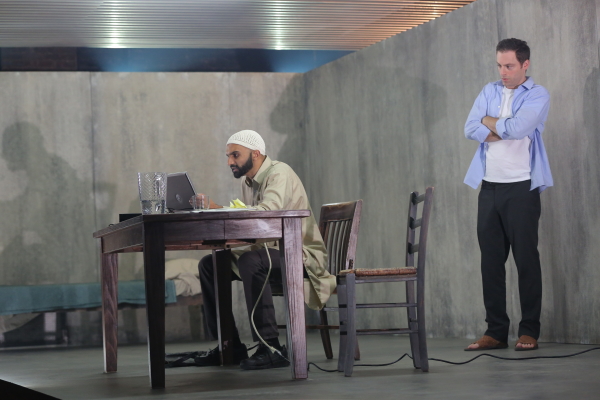The Invisible Hand

(© Joan Marcus)
How free is the free market? The title of Ayad Akhtar's The Invisible Hand, now making its New York debut at New York Theatre Workshop, refers to the classical liberal idea that competing interests in a free market will always necessarily keep one another in check. This, of course, assumes a marketplace of equals, each enjoying equal protection under the law. Real-world political power violently collides with that notion in this provocative and timely new play from the author of Disgraced. Like Akhtar's previous works, this one will undoubtedly lead you out of the theater in a heated debate, reexamining the preciously held beliefs that buttress modern American life.
Nick Bright (Justin Kirk) is an American financier working in Pakistan on behalf of Citibank, which is collaborating with the government to privatize the country's water supply (to the great benefit of corrupt water minister Bilal Ansoor). When a militant Islamist group led by Imam Saleem (Dariush Kashani) attempts to kidnap Ansoor, they inadvertently grab Nick instead. The Imam thinks he can get a ransom of $10 million, but Nick knows that Citibank won't pay that, even if they were legally allowed. Instead, he convinces the Imam that he can raise his own ransom by strategically investing in the Pakistani market, using the group's knowledge of impending terrorist attacks to "short" investments controlled by Pakistani government ministers.
The Imam agrees, but on the condition that his lieutenant Bashir (Usman Ally) actually performs all the trades. Nick is not to touch a computer. Like a cross between Wall Street and Zero Dark Thirty, the two embark on a deadly spate of insider trading and make a killing in the market.
All this takes place in an impersonal concrete and corrugated iron cell that appears to have been decorated by Osama bin Laden. (It was actually designed by Riccardo Hernandez.) Tyler Micoleau's harsh fluorescent lighting exposes the grime while moonlight streams through the room's one barred window, illuminating Nick's nocturnal efforts at escape. These tense scenes are exacerbated by sound designer Leah Gelpe, who underscores the scene transitions with heart-pounding drums. By contrast, the days are accompanied by the faint yet menacing hum of American predator drones.
Director Ken Rus Schmoll (who tackled the subject of drones in Grounded) successfully infuses Akhtar's occasionally dense examination of foreign affairs and finance capitalism with a healthy dose of good old-fashioned thrills. Thanks to the impeccable work of fight director Thomas Schall, The Invisible Hand is just as pulse-raising as a Hollywood action film, but infinitely smarter. Schmoll has led the cast to performances that not only illuminate Ahktar's language, but keep emotions running high.
Kirk endows Nick with a gentle likability that mitigates the potentially darker aspects of his bio. While Akhtar never seeks to justify Nick's mercenary reason for being in Pakistan in the first place, Kirk succeeds in portraying a man who is more willfully ignorant than malicious.
But for Bashir, there is no doubt: Nick is a greedy American. Ally deftly navigates a difficult character arc: In the beginning, he plays an angry young man, impatient and foolish. He speaks with a lower-class British accent that wouldn't sound out of place in an ISIS video. As he learns the ruthless art of capitalism from Nick, he slowly calms and matures while never losing any of his ideological conviction.
One fanatic who never seems to learn, however, is the Imam. Crushing all sympathy we might have for the kindly old cleric with a love for children, Kashani's skin-crawling performance lets us know the truth: This guy is a real bastard. His sanctimonious parables (delivered with a cruel grin) are too clever by half. He lectures everyone about righteousness, but then engages in supremely duplicitous behavior. Most frustratingly, he seems gleefully ignorant of his hypocrisy.
And then there's Dar (Jameal Ali), the most fascinating character on the stage. He's a hired gun for the Imam and plays the part with sufficient brutality in front of his boss. Yet when he's alone with Nick, he removes the handcuffs and boasts about the windfall in potato sales he made by following the captive banker's advice: a whopping $75. With Ali's authentic and subtly layered performance, we know from the earliest moments that Dar is a nice guy driven to violence through the sale of his labor. He quietly follows orders, happy with the little bit of money that trickles down to him from his superiors. And yet, he's the only character onstage consistently with a gun at his side. What exactly is keeping Dar from blowing these unscrupulous rich guys away and taking the money for himself?
With astounding breadth of thought, Akhtar has created a microcosm of global economics and politics in just four characters. As you watch the story unfold, you're likely to experience a range of emotions: horror, disgust, anger, and begrudging admiration; some of these might even stem from the irresistible tribalism about which Akhtar writes so eloquently in Disgraced.
In its grand scope and intellectual ambition, The Invisible Hand is an even more impressive play than that Pulitzer Prize winner. Ayad Akhtar is one of the most important voices in the modern theater. Don't miss this opportunity to see an early work by someone destined to be the next great American playwright.










